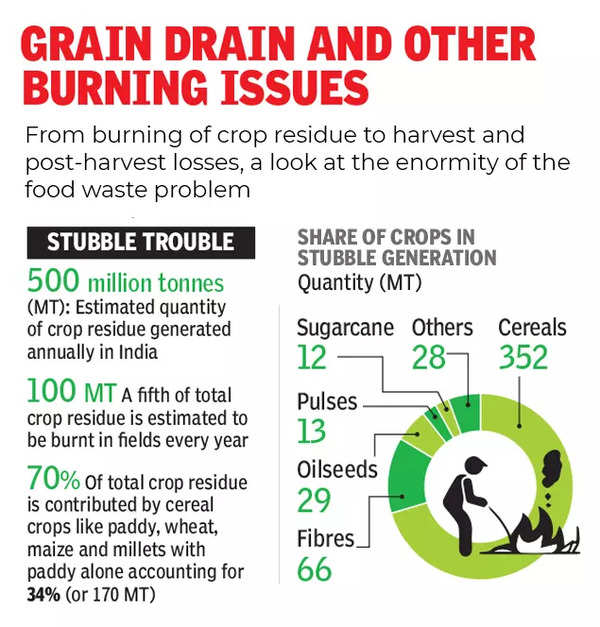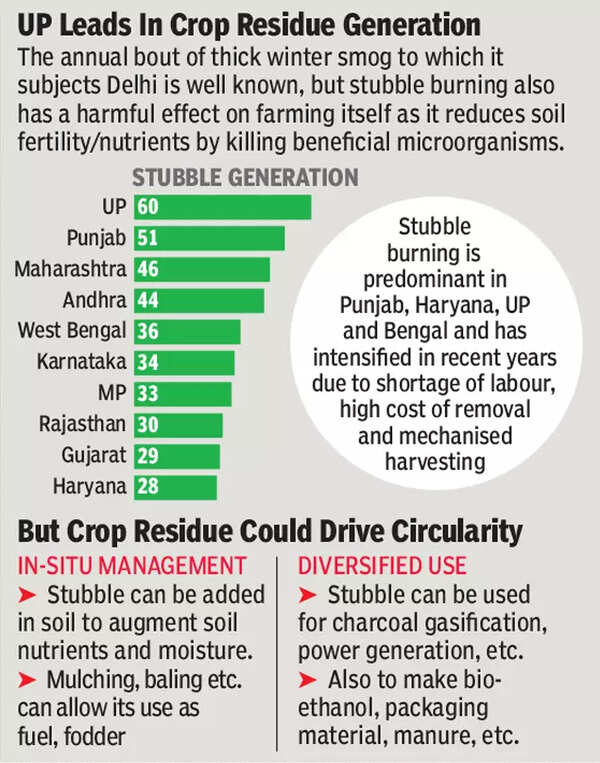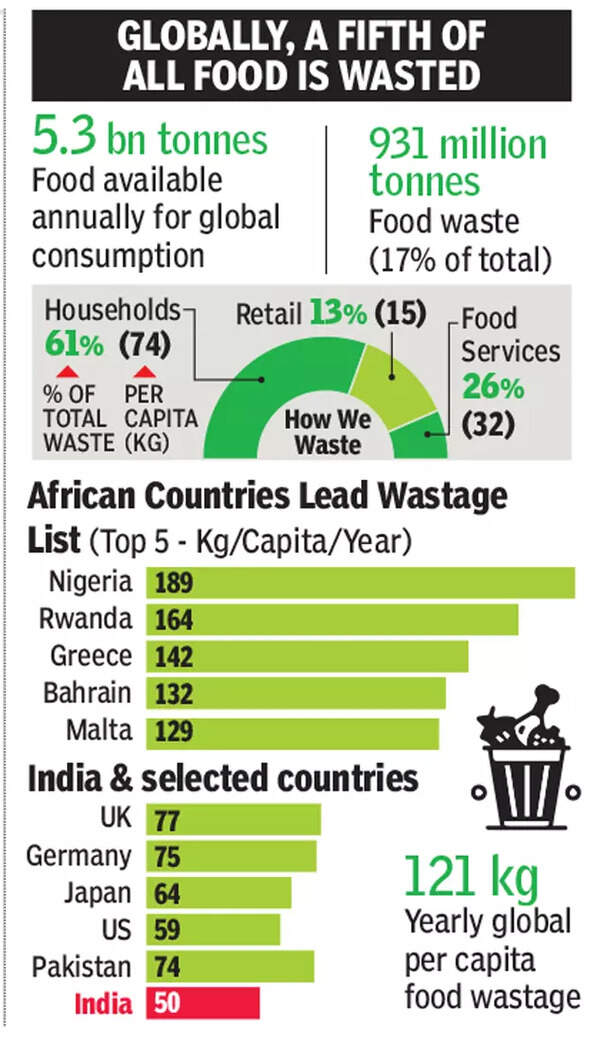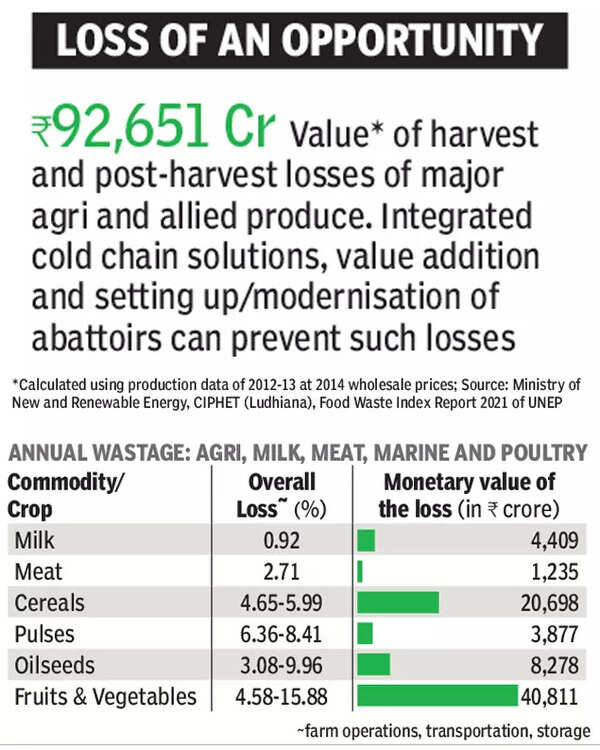It's time to put FARM and FOOD waste to use -Courtesy TOI 16.7.22
NEW DELHI: Every year India generates about 500 million tonnes of farm waste, and Indian households waste 50kg food, per capita. In financial terms the harvest and post-harvest losses of major agricultural and allied produce amount to Rs 92,651 crore yearly.
But economic loss is not the only concern. Improper management of this waste has also been causing pollution of air, water and soil, which damages human health and the environment, and may affect the country’s food and nutritional security in the long run.

The burning of crop residues in Punjab, Haryana and Uttar Pradesh that substantially deteriorates the air quality may appear to be a brief seasonal problem. But it has a far-reaching adverse impact on soil health through the killing of beneficial soil microorganisms.
Decline in soil fertility over the years ultimately prompts farmers to use more chemical fertilisers which, in turn, pollute the water bodies through irrigation runoff.

However, only one-fifth of India’s total crop residue is burnt; 80% is used as bedding material for animals and livestock feed, for soil mulching, biogas generation, making bio-manure/compost, thatching rural homes, mushroom cultivation, fuel for domestic and industrial use, etc. This gives hope that the right policy interventions, hand-holding of farmers and the participation of private players in managing farm waste will increase its use and generate natural resources.
Globally, 931 million tonnes of food (17% of total available food for consumption) gets wasted or lost every year. Nearly two-thirds of biodegradable municipal solid waste, in fact, comprises domestic kitchen waste from households. If not managed properly, such waste generates greenhouse gases and foul odours around landfill sites.

The principles of circularity may play an important role in farm and food waste management where biological materials, unlike waste in non-farm sectors, can be safely returned to the natural environ- ment through biodegradation. It provides biological nutrients to the soil that are essential for the growth of crops/plants and farm production, and so it can complete the biological cycle.
Such a method of circularity for managing paddy stubble gained traction in Punjab, Haryana, Uttar Pradesh and Delhi last year with the use of Pusa bio-decomposer, a bio-enzyme developed by the Indian Agricultural Research Institute (IARI). The bio-enzyme is made up of eight fungi, which when mixed with crop stubble, decompose it into manure.

The IARI gave licences to different private companies, including nurture. farm, to develop a ready-to-use formulation of the bio-decomposer and make it readily available to farmers. Last year nurture. farm helped 25,000 farmers with the spraying of the bio-decomposer over 4. 2 lakh acres of paddy fields in Punjab (14 districts) and Haryana (9 districts).
Pranav Tiwari, CTO of nurture. farm, said an impact verification study by IIM Rohtak found that the bio-decomposer “helped in avoiding stubble burning in 92% of the serviced areas in both the states and also in reducing fertiliser usage by 20-25%”. He said farms that used the bio-decomposer had better yields.
Tiwari said the company would try to apply the bio-decomposer to twice the area this year, and may expand to other states, depending on the availability of resources. There are several successful government models to promote the bioeconomy through circularity principles in the states also. Under the ‘Sukhet’ model developed by the Rajendra Prasad Central Agricultural University (RPCAU), Pusa, Samastipur in Bihar, people can get LPG cylinder refills in exchange for cow dung and household waste. Prime Minister Narendra Modi mentioned ‘Sukhet’ in his monthly radio programme ‘Mann Ki Baat’ last year when he appealed to panchayats across the country to emulate such innovative practices.
“The Sukhet model stresses on creating a self-sustained circularand bio-economy at the village level. Besides promoting rural sanitation, it also monetises cow dung and household waste, and improves soil health as the waste is converted into vermicompost (organic manure),” said R C Srivastava, former RPCAU vice chancellor who conceptualised the model.
The premier farm research body, Indian Council of Agricultural Research (ICAR), has also come out with a compendium – Creating Wealth from Agricultural Waste – of 140 technologies which may help farmers/stakeholders in utilising farm waste for making various biodegradable products.
FOLLOW US ON SOCIAL MEDIA
FACEBOOKTWITTER

Comments